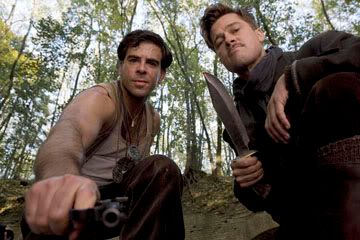

As Lt. Aldo Raine (Brad Pitt) holds his bloody knife and cuts a Nazi symbol into the forehead of Col. Hans Landa (Cristophe Waltz) in the film's final frame, he mutters to himself, "This might just be my masterpiece." And with a self-assured confidence we've come to expect from writer/director Quentin Tarantino, there is no doubt that he speaks for his own boldly audacious and wickedly fantastical war movie, "Inglourious Basterds." With this latest film of his, he once again demonstrates that he is a director of his own accord and provides joyously freewheeling entertainment that will infuriate and startle some audiences. Most of all, though, Tarantino still holds on to his inexplicable ability to enthrall. Even with a gaudy 153-minute running time, there is never a dull moment. From start to finish this is Tarantino at the top of his classic form, and it's a dramatically exuberant celebration of filmmaking.
This isn't a Hollywood war epic starring Brad Pitt (whose part isn't even that significant) as some of the promotions are making it out to be. European in its style and design, this film holds all of the Tarantino signatures such as the sequences of lengthy dialogue and eruptions of bloody violence. "Basterds" isn't so much about war as it is about the movies. Tarantino has reimagined WWII and has spun it into his own twisted fairy tale, making the war conclude the way he sees most fit, and that is through the infinite power of cinema. Endlessly referential, both reflexively and culturally, the movie includes Samuel L. Jackson voiceovers, a David Bowie song on the soundtrack, and even music recycled from the "Kill Bill" films. Even the title is an homage to the 1978 B-movie, "The Inglorious Bastards." It is, however, no remake, and it's Tarantino through and through as he infuses his love for movies into his own work. And so it's rightfully fitting that the key location of the film is a movie theater.
The opening of "Basterds" focuses on a French Jewish woman named Soshanna (Mélanie Laurent) who witnesses her family's slaughter by the hands of the SS under the control of Col. Hans Landa, "the Jew Hunter." In the movie's first chapter (it is divided into five chapters, the first being titled, "Once Upon a Time...In Nazi-Occupied France"), which is brilliant on its own, Christophe Waltz plays Landa with a strangeness like no Nazi ever before to be represented onscreen. He's well-mannered yet sinister but also equally absurd. He's the absolute forefront of the cast of colorful players to fill the screen. Soshanna flees to Paris where she runs a movie theater and gets approached by a Nazi war hero, Frederick Zoller (Daniel Bruhl), who convinces Joseph Goebells to hold the premiere of the movie "Nation's Pride," which glorifies Zoller's exploits. The premiere will consist of an audience full of Nazis not limited to Adolf Hitler (Martin Wuttke) himself. Soshanna fulfills a tale of revenge as she becomes a femme fatale donning plump red lipstick and a curvy red dress. And having to play her as a woman always undercover, Mélanie Laurent is a marvel as she conveys a wide range of emotions, the terror and horror, beneath a composed surface.
And then there are the Basterds led by the smooth-talking Southern boy, Lt. Aldo Raine, who is in the business for killing Nazis. He stands before his comrades demanding from them 100 Nazi scalps. Among the bunch is "the Bear Jew" (Eli Roth). It's funny to note that Eli Roth, the man behind the "Hostel" torture-porn films, plays the brute of a man who gets extreme pleasure out of beating Nazis with a baseball bat. The separate story of these Basterds eventually collides with that of Soshanna along with the British high command (Mike Myers in an unrecognizable cameo) and another woman, a German movie star-turned-Allied spy named Bridget von Hammersmark (Diane Krueger), who appears in a prolonged tavern scene that is reminiscent of the conversations in "Pulp Fiction." It all comes full circle during the climactic end when the draw of moviegoing plays a role in ending the Third Reich.
Quentin Tarantino films defy description and have the knack to grow on you because you feel there's something to them, something that requires a second or third viewing. "Inglourious Basterds" is another one of those films. So, is this Tarantino's best yet? I'll never say. And how can you? He is a director of unexpected delights, one who consistently brings something new yet familiar to the table. Here, he uses clichés from war movies and other genres only to then explode apart those clichés to remind us just how awful WWII was. This is like nothing else you'll see in theaters this year. In what other movie can you watch Hitler take multiple gunshots to the face?





No comments:
Post a Comment